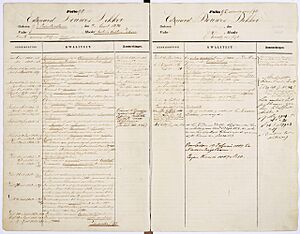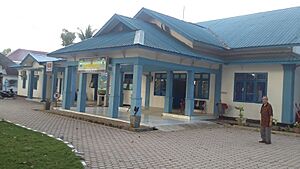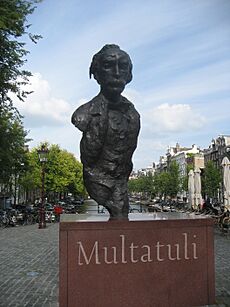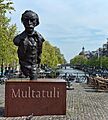Multatuli facts for kids
Quick facts for kids
Multatuli
|
|
|---|---|

Eduard Douwes Dekker, also known as Multatuli in 1864
|
|
| Born |
Eduard Douwes Dekker
2 March 1820 |
| Died | 19 February 1887 (aged 66) Nieder Ingelheim, Rhine, German Empire
|
| Occupation | Writer |
Eduard Douwes Dekker (born March 2, 1820 – died February 19, 1887) was a famous Dutch writer. He is better known by his pen name, Multatuli. This name comes from Latin and means "I have suffered much." Multatuli is most famous for his book Max Havelaar (1860). This novel bravely spoke out against the unfair treatment of people in the Dutch East Indies (now Indonesia) by colonial rulers. Many people consider him one of the greatest writers from the Netherlands.
Contents
Early Life and Education
Eduard Douwes Dekker was born in Amsterdam. He was the fourth of five children in a Mennonite family. His parents were Sietske Eeltjes Klein and Engel Douwes Dekker. His father was a sea captain. The family kept both of his father's parents' last names, Douwes and Dekker.
As a teenager, Eduard went to school in Amsterdam. His father first wanted him to become a minister. But this idea was later dropped. Eduard then worked for a short time as a clerk at a company that made textiles.
Working in the Dutch East Indies
In 1838, Eduard sailed to Batavia (now Jakarta) in the Dutch East Indies. He worked there for about 20 years in different government jobs. He started in the accounting department. Later, he became an administrative officer, but he did not enjoy working with money.
In 1842, he became a comptroller in Natal, a difficult area in North Sumatra. He faced problems with money and records there. Some of these problems were from before he started his job. He received a strong warning from a general. Eduard felt very upset by this. He even wrote a play about it. He later used parts of this experience in his novel Max Havelaar.
Eduard admitted he was not good at administrative work. He often made mistakes and caused delays. He also did not follow the unwritten rules of the local government. He eventually paid back the missing money himself. He was then moved to another job.
New Roles and Challenges
After working in a few other places, Eduard was sent to Menado in 1848. His career started to improve there. The local leader, Reinier Scherius, believed in treating the local people fairly. Eduard shared this view. When Scherius left in 1851, he suggested Eduard take his place. But the government did not agree. Eduard still had money problems, including private debts.
At the end of 1851, he was promoted and sent to Ambon. After a few months, he went back to the Netherlands for health reasons. From 1852 to 1855, he was in Holland. During this time, he got into more debt. Even after becoming a famous writer, he struggled with debt for most of his life.
In 1857, he became Assistant Resident of Lebak in Java. By this time, he was openly speaking out against the unfairness of the Dutch colonial system. He was threatened with being fired. Instead, he quit his job and returned to the Netherlands.
Writing Career
Eduard wanted to show everyone the unfair things he had seen in the Dutch East Indies. He started writing articles and pamphlets for newspapers. But not many people noticed them at first. Then, in 1860, he published his powerful anti-colonial novel, Max Havelaar: The Coffee Auctions of the Dutch Trading Company. He used the pen name Multatuli for this book. As mentioned, his pen name means "I have suffered much" in Latin. It refers to his own struggles and the suffering of those he saw treated unfairly.
The book caused a huge stir. People who supported colonialism said Multatuli was exaggerating. They tried to make him take back the book, but he refused. Some critics said the book was not good writing. However, Max Havelaar was read all over Europe. A poet named Carel Vosmaer supported Multatuli. He wrote a book praising Multatuli in 1874.
Multatuli kept writing a lot. His second book, Minnebrieven (Love Letters, 1861), was actually another sharp satire. It was written as if it were a made-up set of letters. The next year, he started publishing many different writings in a series called Ideën (Ideas). Seven volumes were published between 1862 and 1877. His novel Woutertje Pieterse (Little Walter Pieterse), which was partly about his own life, first appeared in the Ideas series.
Multatuli also tried writing plays. One of his plays, Vorstenschool (The School for Princes), was published in 1872. It showed his strong opinions on politics, society, and religion. People were worried it might upset the Dutch king. So, it took three years before the play was performed. The first show and the tour were very successful. This was one of the best moments in Multatuli's writing career.
Multatuli stopped writing quite suddenly in 1877. He had moved to Germany about ten years earlier. He settled in the town of Ingelheim am Rhein.
Family Life
Multatuli married Everdine Hubertina van Wijnbergen on April 10, 1846. They had two children, a son named Edu (born 1854) and a daughter named Nonni (born 1857). Multatuli's relationship with his son Edu was difficult throughout his life.
Multatuli and his wife eventually separated. This was largely because of his money problems. Everdine died in 1874. Not long after, Multatuli married Maria Hamminck Schepel.
Lasting Impact
Multatuli was one of Sigmund Freud's favorite writers. Freud even listed him among his "ten good books" in 1907. Many other famous writers and thinkers admired Multatuli, including Karl Marx, Hermann Hesse, and Thomas Mann. Many early feminists also appreciated his work.
In June 2002, the Dutch Society of Dutch Literature called Multatuli the most important Dutch writer of all time.
Two literary awards are named in his honor: the annual Multatuli Prize and the Woutertje Pieterse Prijs. The second prize is named after a character from his book De geschiedenis van Woutertje Pieterse.
There are two museums dedicated to Multatuli. The Multatuli Museum in Amsterdam is located where he was born. Another Multatuli Museum opened in 2018 in Rangkasbitung, Indonesia. Multatuli was cremated in Gotha, Germany. His ashes were later moved to a cemetery in Driehuis, Netherlands. His first wife, Tine, is buried in the San Michele cemetery in Venice.
An Indonesian Navy command ship was named KRI Multatuli to honor him.
Images for kids
See also
 In Spanish: Multatuli para niños
In Spanish: Multatuli para niños
- W. R. van Hoëvell
- Multatuli Museum (Netherlands) (in Dutch, Multatuli Huis) and Multatuli Museum (Indonesia)
- Multatuli Prize














